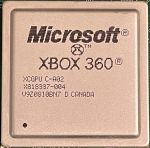XCGPU: Difference between revisions
No edit summary |
No edit summary |
||
| (19 intermediate revisions by the same user not shown) | |||
| Line 1: | Line 1: | ||
{{Infobox Chip | {{Infobox Chip | ||
| name = XCGPU | | name = XCGPU | ||
| image = X818337.jpg | | image = X818337-004.jpg | ||
| image_size = 150px | | image_size = 150px | ||
| caption = The original XCGPU, [[ | | caption = The original XCGPU, [[Vejle]] | ||
| introduced = 2010 | | introduced = Mid 2010 | ||
| designedby = | | designedby = IBM<br>Microsoft | ||
| type = SoC | | type = SoC | ||
| usedin = [[Xbox 360 S]]<br>[[Xbox 360 E]] | | usedin = [[Xbox 360 S]]<br>[[Xbox 360 E]] | ||
| Line 14: | Line 14: | ||
| cores = 3 (CPU) | | cores = 3 (CPU) | ||
| threads = 6 (CPU) | | threads = 6 (CPU) | ||
| predecessor = [[XCPU]]<br>[[ | | predecessor = [[XCPU]]<br>[[GPU]] | ||
}} | }} | ||
{{See also|XCPU|GPU}} | |||
The '''Microsoft XCGPU''' | The '''Microsoft XCGPU''' is a combination of the [[XCPU]] and [[Xenos]] GPU. It was created in order to reduce the size and complexity of the motherboard for the [[Xbox 360 S]]. The XCGPU is the first high performance integrated system-on-a-chip. The XCGPU contains an "emulated" FSB between the CPU and GPU areas of the die. This ensures that latencies are the same, making the XCGPU perform as close as possible to the previous separate CPU and GPU. | ||
The XCGPU was developed by Microsoft and IBM. | The XCGPU was developed by Microsoft and IBM. | ||
| Line 31: | Line 32: | ||
{{EDRAM Specs}} | {{EDRAM Specs}} | ||
== | == Variants == | ||
=== | === Vejle (45nm) === | ||
{{Main| | {{Main|Vejle}} | ||
In 2010, the XCPU was shrunk to the 45nm process and combined with the [[Xenos]] graphics chip to create a system-on-a-chip, called the [[XCGPU]]. The [[eDRAM]] remains on a separate die and an [[IHS]] was added. | In 2010, the [[XCPU]] was shrunk to the 45nm process and combined with the [[Xenos]] graphics chip to create a system-on-a-chip, called the [[XCGPU]]. The [[eDRAM]] remains on a separate die and an [[IHS|integrated heat spreader]] was added. Named [[Vejle]], it is used on the [[Trinity]] and [[Corona]] motherboards. | ||
=== | === Oban (32nm) === | ||
{{Main| | {{Main|Oban}} | ||
In 2014, the XCGPU process was shrunk | In 2014, the XCGPU process was shrunk to the 32nm process and the eDRAM die was integrated into the CGPU die. The single die design meant that the [[IHS|integrated heat spreader]] was no longer needed. Named [[Oban]], it is used on the [[Winchester]] motherboard and is notable for patching the RGH exploit. | ||
{{Motherboard Components}} | {{Motherboard Components}} | ||
[[Category:Motherboard Components]] | [[Category:Motherboard Components]] | ||
Latest revision as of 23:49, 7 April 2024
 The original XCGPU, Vejle | |
| Introduced | Mid 2010 |
|---|---|
| Designed By | IBM Microsoft |
| Type | SoC |
| Used In | Xbox 360 S Xbox 360 E |
| Clock Speed | 3.2GHz (CPU) 500MHz (GPU) |
| Cache | L1: 32KB/32KB (CPU) L2: 1MB (CPU) |
| Memory | 10MB eDRAM (GPU) |
| Instruction Set | PowerPC RISC (CPU) |
| Cores | 3 (CPU) |
| Threads | 6 (CPU) |
| Predecessor | XCPU GPU |
The Microsoft XCGPU is a combination of the XCPU and Xenos GPU. It was created in order to reduce the size and complexity of the motherboard for the Xbox 360 S. The XCGPU is the first high performance integrated system-on-a-chip. The XCGPU contains an "emulated" FSB between the CPU and GPU areas of the die. This ensures that latencies are the same, making the XCGPU perform as close as possible to the previous separate CPU and GPU.
The XCGPU was developed by Microsoft and IBM.
Specifications
CPU
- 3 two-way SMD-capable RISC cores clocked at 3.2GHz
- SIMD: Two VMX128 units
- 32KB L1 data cache
- 32KB L1 instruction cache
- 1MB L2 cache at 1.6 GHz with a 256-bit bus
- 21.6GB/s FSB
- 768 bits of IBM eFUSE One-Time-Program memory for fusesets
- One-Time-Programmable ROM and 64KB SRAM for the 1BL and Config Ring
- Big-endian architecture
GPU
- 500Mhz clock speed
- 48 floating-point vector processors divided into 3 dynamically scheduled SIMD groups (16 each)
- Unified shader architecture
- 16 texture addressing units
- 16 texture filtering units
- 8 pixel rendering pipelines
- Direct access to CPU L2 cache
eDRAM
- 10MB 256GB/s eDRAM
- Contains logic for:
- 4-sample anti-aliasing
- Alpha compositing
- Color
- Z/stencil buffering
Variants
Vejle (45nm)
In 2010, the XCPU was shrunk to the 45nm process and combined with the Xenos graphics chip to create a system-on-a-chip, called the XCGPU. The eDRAM remains on a separate die and an integrated heat spreader was added. Named Vejle, it is used on the Trinity and Corona motherboards.
Oban (32nm)
In 2014, the XCGPU process was shrunk to the 32nm process and the eDRAM die was integrated into the CGPU die. The single die design meant that the integrated heat spreader was no longer needed. Named Oban, it is used on the Winchester motherboard and is notable for patching the RGH exploit.